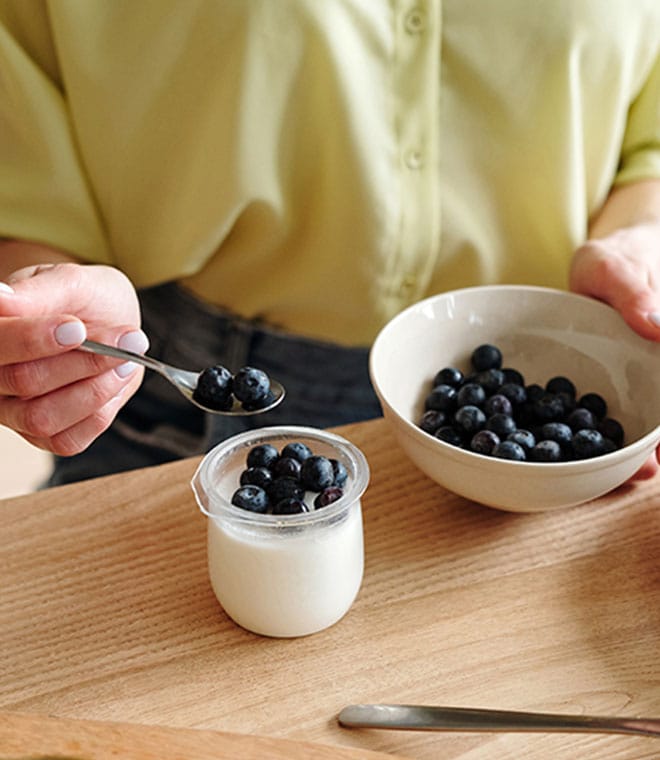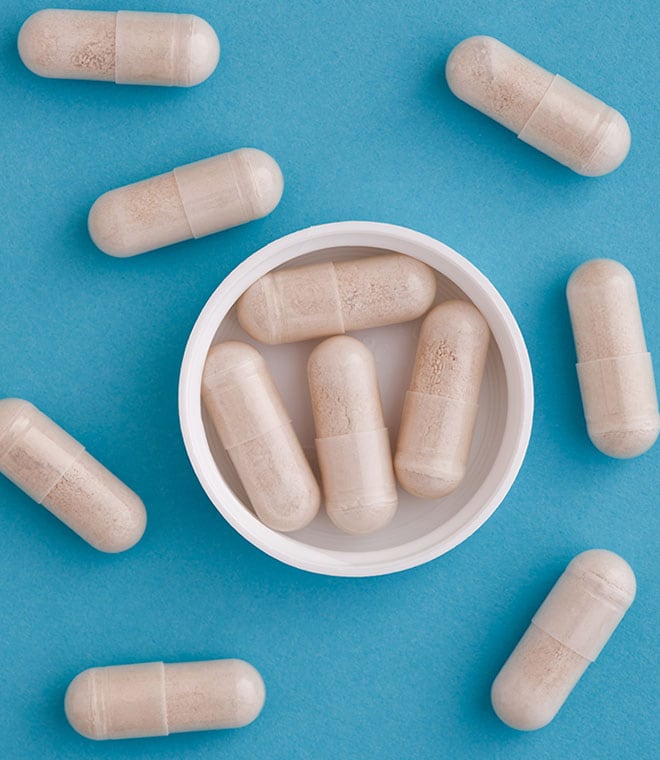
Buying Guides
What to look for in a probiotic
By Michelle Katz, MS, RD, CDCES Oct 29, 2024 • 5 min
Probiotics are beneficial bacteria found naturally in the digestive system and elsewhere in the body. In some cases, healthcare providers recommend boosting probiotic levels by eating yogurt and fermented foods, such as kimchi, sauerkraut, or kefir, or by taking supplements. Probiotic supplements may be formulated to address specific concerns, and they vary in terms of the types and number of microorganisms they contain. Ask your healthcare provider which probiotic supplement may be right for you. People who have a compromised immune system or other health conditions should consult with their healthcare provider before taking probiotic supplements.
When you’re looking at a probiotic product label, you should pay attention to certain information including:
- The number of colony forming units (CFUs) in a serving: CFUs are a more accurate count compared to total weight of the number of live microorganisms. However, a higher CFU count does not necessarily equal more health benefits.
- The listed ingredients: Take note of the genus, species, and strain of each probiotic microorganism that may be helpful for certain conditions. It’s also important to look for any ingredients that may cause an allergy.
- The expiration date: Make sure the product is within the use or sell by date.
- Storage instructions: Some products need to be stored in a refrigerator while others may be stored at room temperature.
Potential health benefits of probiotics
Studies on probiotics are still ongoing and some findings are inconclusive. Scientists are still researching if and which probiotics may be beneficial for certain health conditions. Most probiotics don’t require FDA approval before they are marketed because they are sold as dietary supplements. Therefore, it’s important to work with your healthcare provider to determine if a probiotic is appropriate for you. It’s also important to choose a trusted brand.
Probiotics for gut health
View probiotics for gut health
In the digestive tract, a healthy microbiome may aid in digestion. Evidence suggests that promoting a balanced microbiome by taking probiotics may help prevent or reduce symptoms of irritable bowel syndrome (IBS), ulcerative colitis, stomach ulcers and diarrhea associated with antibiotic use or certain bacterial infections. Some people also take digestive probiotic supplements to promote bowel regularity. Supplements intended for gut health are usually taken orally to deliver probiotics directly to the digestive tract.
Probiotics for vaginal health
View probiotics for vaginal health
Like the digestive system, the vagina has its own microbiome, and when imbalances happen, infections may occur. Bacterial vaginosis, or BV, occurs due to an overgrowth of bacteria in the vagina, while uncontrolled growth of yeast can result in vaginal yeast infections.
Although more research is needed, some studies suggest that oral probiotic supplements may help promote a healthy microbiome in the vagina, potentially decreasing the risk of these types of infections. Two probiotic strains that have shown promising results in oral vaginal health supplements include Lactobacillus crispatus and Lactobacillus rhamnosus. Studies also indicate that suppositories containing the bacteria Lactobacillus acidophilus may also lower the likelihood of bacterial overgrowth in the vagina.
Probiotics for immunity
In the digestive tract, probiotics may support the immune system's actions by keeping potentially harmful bacteria in check. As a result, some people take oral probiotic supplements intended for general immune support. There is also a belief that oral probiotics may reduce inflammation and allergies. However, studies investigating these potential benefits have yielded mixed results, so further research is necessary to explore their effectiveness.
Probiotics for skin health
View probiotics for skin health
Trillions of microorganisms reside on the skin's surface, creating another microbiome. In recent years, researchers have begun exploring how maintaining a healthy balance of microorganisms may contribute to skin health. While more studies are needed in this area, some people take oral or topical probiotics to promote overall skin health. Researchers are also exploring whether topical or oral probiotics may be beneficial for managing chronic skin conditions, such as eczema.
Published October 2024.
Sources:
- https://sncs-prod-external.mayo.edu/hometown-health/speaking-of-health/whats-the-deal-with-probiotics
- https://my.clevelandclinic.org/health/treatments/14598-probiotics
- https://health.clevelandclinic.org/how-to-pick-the-best-probiotic-for-you
- https://www.nccih.nih.gov/health/probiotics-what-you-need-to-know
- https://health.clevelandclinic.org/probiotics-for-vaginal-health
- https://www.nccih.nih.gov/health/tips/things-to-know-about-probiotics
- https://medlineplus.gov/druginfo/natural/790.html
- https://www.mayoclinic.org/healthy-lifestyle/nutrition-and-healthy-eating/expert-answers/probiotics/faq-20058065
- https://www.mayoclinichealthsystem.org/hometown-health/speaking-of-health/an-introduction-to-probiotics
- https://www.jax.org/news-and-insights/minute-to-understanding/what-is-the-skin-microbiome
- https://www.health.harvard.edu/staying-healthy/how-to-get-more-probiotics
- https://ods.od.nih.gov/factsheets/Probiotics-Consumer/
- https://www.acog.org/womens-health/experts-and-stories/the-latest/think-you-have-a-vaginal-infection-heres-what-you-need-to-know
- https://www.nccih.nih.gov/health/probiotics-usefulness-and-safety



